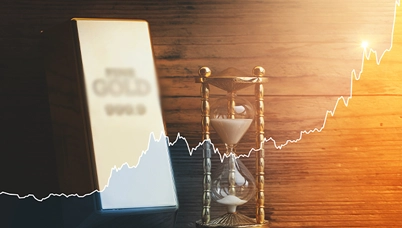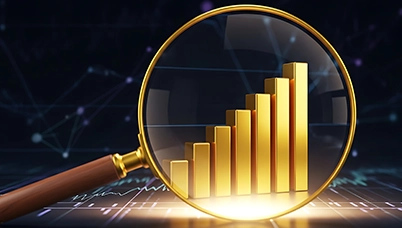The US-China clash for supremacy is set to drive gold higher
Posted On Monday, Jun 08, 2020
Historically, there have been numerous instances when gold prices have been influenced by escalation and de-escalation of geopolitical stresses. Gold’s stellar performance of ~+24% in 2019, a year marked by trade tensions between the two largest economies of the world, is recent proof.
In 2020 and the years to come, the world is likely to witness destabilizing effects of a US-China rivalry. This will have consequences for global order and governance. The increased uncertainty in equity and credit markets will trigger a risk-off sentiment and push up investment demand for relatively safer alternatives like gold.
Tit for tat tariff wars
Even before he won office, Trump had expressed his disapproval of China taking advantage of the US economically, pointing out the wide trade deficit between the two countries.
After he moved into the White House, Trump began to roll out tariffs on billions of dollars of Chinese goods in mid-2018 to put pressure on the world’s largest exporter to balance trade by changing the way it did business with the US. Among the demands were an increase in US goods purchased by China and an end to the theft of US companies' intellectual property.
The Chinese government retaliated with tariffs of their own, beginning an 18-month long trade war. Finally in January this year, the two sides agreed to a phase one deal, reducing tariffs in exchange for China agreeing to buy more US goods.
But there was wide consensus that any phase two deal would have to tackle the thornier issues, such as intellectual property theft, and would thus be difficult to agree on.
Then came the pandemic.
COVID-19
Rather than encouraging greater cooperation, COVID-19 has further soured US-China relations amid the unfinished trade war. A war of words has ensued between the two countries with both sides blaming each other. Trump has criticized China’s response to the virus outbreak and referred to COVID-19 as the ‘Wuhan’ or ‘Chinese’ virus. On the other hand, the Chinese have gone as far as to back the conspiracy theory that the coronavirus was a bioweapon manufactured in American laboratories.
Both sides seem to be blaming the other for the origin and severity of the crisis as they seek to divert attention from troubling domestic issues. Contracting exports and rising unemployment have pushed China toward its worst downturn in generations. Similarly, the US, with unemployment almost at 15% and the highest number of cases from a single country, is marred with problems of its own.
A lot will depend on whether the phase one deal makes it through the US elections. With China hit by a virus-induced economic deceleration, it looks unlikely that the country will be able to meet its phase one pledge to buy an additional $200 billion of US products this year and next year. The clash will likely get fiercer around the time of US elections in November. Trump has already begun to blame China for the deaths and disruption caused by the virus as it threatens his chances of victory. He will likely get more aggressive in his rhetoric and response to China if he is seen trailing in polls, and will be open to all options in a bid to get re-elected.
A clash for supremacy at the core
But with the pandemic massively hurting their economies, both countries probably have less appetite for a tariff war. As such the tensions between the two could manifest on other fronts such as currency, military, technology, international cooperation, and even ideology. For instance, American anger at the tens of thousands of lives lost by the pandemic is being increasingly directed at the Chinese Communist Party’s suppression of freedom of speech and attempts to cover-up the virus. Or the US’s allegation that the WHO has been biased towards Beijing in spite of America providing the majority of funding to the organization. Or America banning Chinese technology giant Huawei on grounds of spying, and forcing its European allies to do the same. Or the territorial disputes between the two countries in the South China Sea.
These issues are deep and will persist even once the pandemic and the 2020 election are over. At the core of these issues is China’s ambition to become a dominant global power and America's resistance to that. As such, tensions between the major economies seem unlikely to de-escalate in the near future, and this clash for supremacy is going to be a long drawn affair.
While risks have been building up in the background way before the viral outbreak, tensions have begun to simmer now.
Brace for increased volatility in U.S.-China relations over the next couple of years, and allocate 10-15% of your investment portfolio to gold to benefit from the metal’s gains during this bumpy ride. The battle between these two world’s power nations will have wide reaching economic ramifications and the tremors will be felt in currency markets. Investors and central banks may look to reduce their reliance on the much involved US dollar and will find their answers towards increasing their allocation to gold given no better alternative.

| Name of the Scheme | This product is suitable for investors who are seeking* | Riskometer |
| Quantum Gold Savings Fund An Open Ended Fund of Fund Scheme Investing in Quantum Gold Fund | • Long term returns • Investments in units of Quantum Gold Fund – Exchange Traded Fund whose underlying investments are in physical gold |  Investors understand that their principal will be at Moderately High Risk |
Disclaimer, Statutory Details & Risk Factors:
The views expressed here in this article / video are for general information and reading purpose only and do not constitute any guidelines and recommendations on any course of action to be followed by the reader. Quantum AMC / Quantum Mutual Fund is not guaranteeing / offering / communicating any indicative yield on investments made in the scheme(s). The views are not meant to serve as a professional guide / investment advice / intended to be an offer or solicitation for the purchase or sale of any financial product or instrument or mutual fund units for the reader. The article has been prepared on the basis of publicly available information, internally developed data and other sources believed to be reliable. Whilst no action has been solicited based upon the information provided herein, due care has been taken to ensure that the facts are accurate and views given are fair and reasonable as on date. Readers of this article should rely on information/data arising out of their own investigations and advised to seek independent professional advice and arrive at an informed decision before making any investments.
Mutual fund investments are subject to market risks read all scheme related documents carefully.
Please visit – https://www.quantumamc.com/disclaimer to read scheme specific risk factors. Investors in the Scheme(s) are not being offered a guaranteed or assured rate of return and there can be no assurance that the schemes objective will be achieved and the NAV of the scheme(s) may go up and down depending upon the factors and forces affecting securities market. Investment in mutual fund units involves investment risk such as trading volumes, settlement risk, liquidity risk, default risk including possible loss of capital. Past performance of the sponsor / AMC / Mutual Fund does not indicate the future performance of the Scheme(s). Statutory Details: Quantum Mutual Fund (the Fund) has been constituted as a Trust under the Indian Trusts Act, 1882. Sponsor: Quantum Advisors Private Limited. (liability of Sponsor limited to Rs. 1,00,000/-) Trustee: Quantum Trustee Company Private Limited. Investment Manager: Quantum Asset Management Company Private Limited. The Sponsor, Trustee and Investment Manager are incorporated under the Companies Act, 1956.
Related Posts
-

Gold Monthly for January 2026
Posted On Thursday, Jan 01, 2026
Gold Market Review and Outlook: 2025–2026
Read More -

Gold Monthly for December 2025
Posted On Thursday, Dec 04, 2025
After a series of events and a strong rally in October 2025, gold demonstrated a mixed performance in November 2025, moving back and forth within a defined range.
Read More -

Gold Monthly for November 2025
Posted On Tuesday, Nov 04, 2025
After a strong September, gold extended its bullish momentum into October, marked by heightened volatility and significant price swings.
Read More



